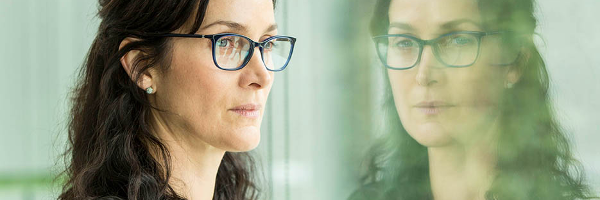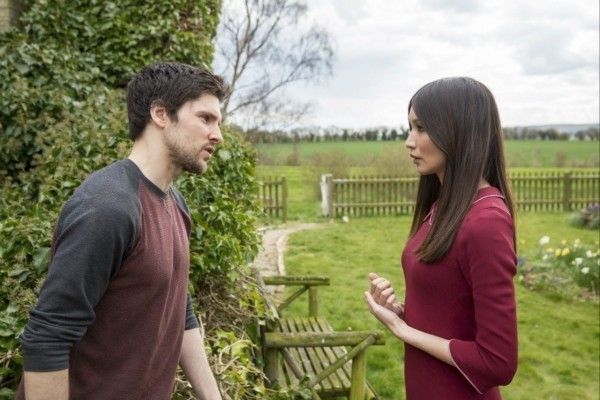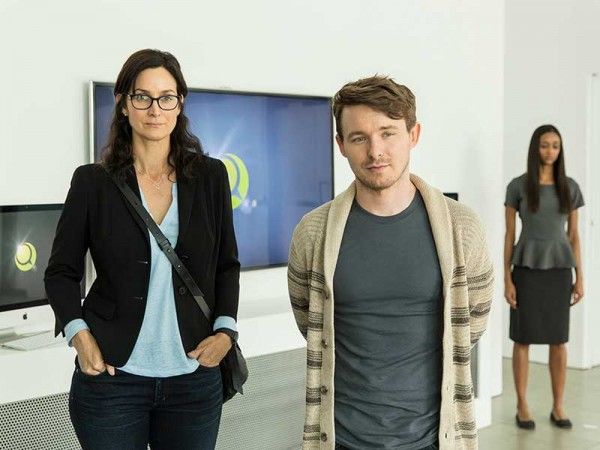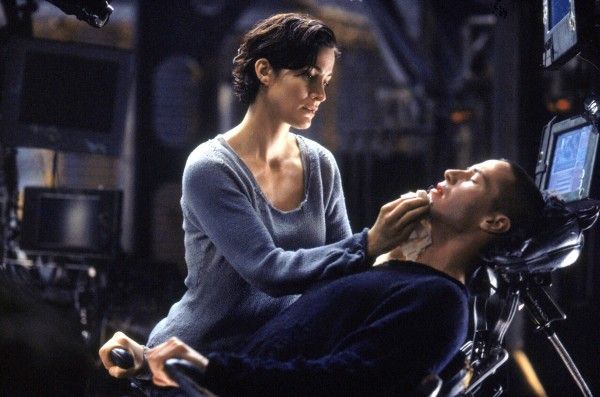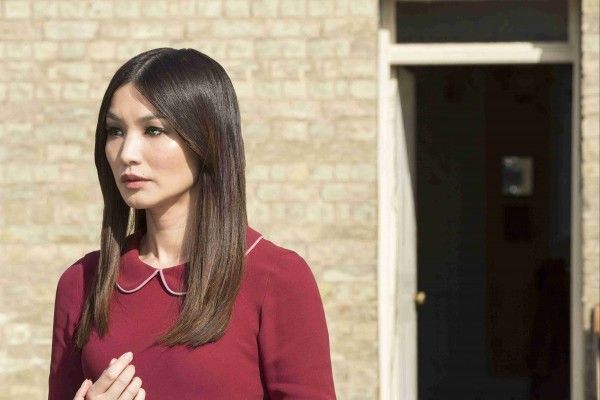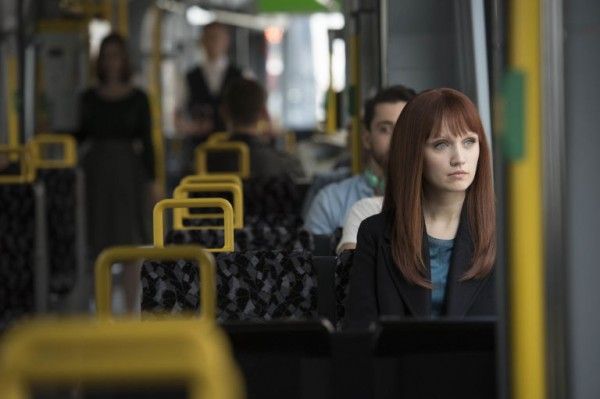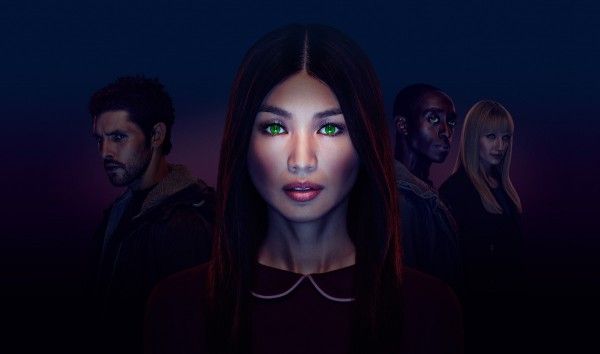The first season of the British tech-drama Humans set the stage for a robot uprising. Set in a futuristic but recognizable world where artificial intelligence-fuelled humanoid robots known as "synths" are as common (and depended on) as smartphones, the series follows Mia (Gemma Chan) and her family of fellow synths on their path to freedom and self-discovery. United at last, the moment has come that they can share their gift for self-awareness with synths the world-over, and Season 2 is set to watch the dominos fall in the aftermath.
With Season 2, Humans introduces a number of new faces, human and synth, and one of them is non-other than Sci-Fi royalty Carrie-Anne Moss. Nearly two decade after getting her big break in The Matrix, Moss is headed back to the realm of high-tech as Dr. Athena Morrow, a brilliant scientist and artificial intelligence researcher who is recruited to help understand the synth awakening.
With Humans returning February 13th to AMC, I joined a small group of journalists for a brief chat with Moss and Chan about Season 2, what's ahead for their characters, the attention to character work and creative support on the show, the secret and why working on Jessica Jones and Humans reminds moss of the indie film scene when she made Memento. Moss also talks about finding the emotional honesty in genre projects like Humans and The Matrix, and how she unlocked the character of Trinity. Check out the full interview below.
So you are playing a new character this season. Can you say a little about, is your character human or synth?
MOSS: Yeah, I play a scientist. Her name is Athena. Yeah, I’m a human being who is interested in AI, and she’s pretty smart.
Gemma, let’s talk about Mia and her path this season. Obviously, there’s a new relationship with the Ed character, which allows for an interesting aspect that the show hasn't really touched on before. This idea of consciousness that you’re starting to develop and what that means for another human in a romantic sense. So what were the most interesting things that was framed for you in terms of the exploration of that relationship?
CHAN: For me, what was really interesting is that at the beginning of Season 2, it’s really the first time that Mia has had a chance figure out who she might be, and where she might fit in the world. She was created for a particular purpose, to look after Leo and the Elster family, and then she ended up with the Hawkins family against her will. So really, it’s the first time she’s really getting a say in what she wants to do. She, for better or worse, wants to put herself out there. She craves human interaction. I see her as something of an innocent still at the beginning of season two. She definitely goes on an interesting journey because her relationships, or her interaction with human beings, have been quite limited so far. There’s a naiveté to some of the way she behaves. I think her natural instinct to look for the best in other human beings, or other synths, is both a great asset to her, but also it could be her downfall as well.
Two producers told me that when you came to audition, you just sort of nailed it immediately... how to be a synth. They say it’s very hard to do that. How did you instinctively know?
CHAN: Oh really? That’s kind of them to say. When I first went in to audition, they gave a brief and they said, you’re obviously playing a character that’s not human, but we don’t want anything overtly robotic, or anything you think that’s being robotic in a cliché way. They didn’t want any kind of quizzical head cocking, or anything like that. They said, definitely don’t come in and do that. You won’t get the job. But they said, we want you to give an indication of what you might do, just to make the movement something that isn’t human.
So I just thought, just from first principles, these things are machines, and every movement uses up battery power. So there’s obviously going to be more of a stillness. That’s what I tried initially. All of us have a lot of physical ticks that we don’t realize that we’re doing subconsciously. So one of the first things I did was to try and kind of neutralize that, which sounds quite easy, but actually sometimes you don’t realize you’re doing things. Apparently, I have an overactive left arm. So yes, that was my first instinct. Then when I got the job, I started working, me and the other actors who play synths in the show, we went to synth school, and we worked with a really brilliant choreographer called Dan O’Neill to hone that movement. So there’s a universal language of movement for all the synths in the show, which is also tailored to each character depending on how old the synth is, or what condition they’re in.
In a science fiction, a lot of these innovators and scientist characters have complex morality. They do things that might seem wrong are harsh, maybe in the pursuit of a good cause, maybe not. They usually get to play a little bit of a bad guy and a little bit of a good guy. Have you found that fertile ground to play in?
MOSS: I love storytelling, I love characters that are complicated and layered, real people; that you see why they do what they do. I was lucky when I got this part that they wrote this really amazing bio for me of her, and so I really got to see all the reasons that she was doing the things that she was doing. So there were all these nuggets of gold that the writers gave me to have in my arsenal of information about her. Because most of the time you have to make those up, which I like to do too. But I felt like they really gave me a lot. Probably the best bio I've ever gotten from anybody, actually, which I appreciated.
You never know, especially on episodic television, you just don't know week to week what's going to happen. And some of the things they wrote in the bio didn't actually execute and then other things did, but that information all informed me as to who she was.
What do you like working with these stories? Obviously, The Matrix is a story about technology as it relates to humanity and where we're going, and so is this. What appeals to you about those kinds of stories?
MOSS: Well, I like stories about the world, where we're at. I like to explore humanity. I like to explore my own humanity. I've never been attracted to sci-fi, per se. People tell me I'm in a genre kind of movie, but it never crossed my mind that The Matrix was genre. To me it was about, for me anyway, my character, I had this rock outside my door which said "faith" or "believe" or something, and I remember felt like that was my key into her, into Trinity. It was like she was the heart of it. I intellectually did not understand what I was doing when I did that role, but I definitely felt it in my feeling body, in my self. But I couldn't have explained it to anybody. So that's not ever necessarily my gift, to explain, so much as I just feel things pretty deeply. So I just love to play characters that are layered and that I can relate to in some way, even if they're completely different than me; that I can see a glimpse of humanity and something I'm interested in exploring.
What would you guys say is the heart of Mia and Athena?
CHAN: The heart of Mia is love, I think. It's the first thing she knew in her bond with Leo. She's a sister, but she's also mother figure as well. She's always searching for love... love and acceptance.
MOSS: And Athena, I think she's so protective of herself because of the pain she's experienced in her life. And so she has created this world of control so that she doesn't have to feel how she feels and at the core of it, I think it's love again. Very deep love for parts of her life that didn't turn out the way she hoped they would and that disappointment.
You've been working more in television lately, between this and Jessica Jones. Have you been finding better roles in TV than in film?
MOSS: I think it's an exciting time to be a woman in television and it's an exciting time in television, period. I feel like it's – I said this last year when I was here with Jessica Jones, it's like what the independent film world felt like when I did Memento. I didn't read a script like that anywhere except in the independent film world, and now it feels like that in television. Every time I hear about a new show and I see show that is being created that is nothing like I've ever thought about, I just get so excited about that expansion. Because I started working when LA Law was on. It was Lawyers and cops. To imagine that it could be this diverse and creative, that television could be this creative, I couldn't have imagined that, I don't think.

